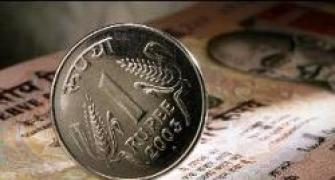 Ahead of the Reserve Bank of India's monetary policy review on Tuesday, Finance Minister Pranab Mukherjee today said inflation was a matter of concern.
Ahead of the Reserve Bank of India's monetary policy review on Tuesday, Finance Minister Pranab Mukherjee today said inflation was a matter of concern. The statement indicated that RBI might further increase policy rates to tame inflation, which was still at an uncomfortably high level.
"Inflation is a matter of concern. The main reason for the high level of inflation is food prices.
"Inflation (is expected) to go down to a more acceptable level," he said on the sidelines of an event.
Mukherjee, however, did not comment on a possible increase in key rates by RBI and said he had taken up the issue with RBI Governor D Subbarao.
In line with the usual practice, the finance minister and the RBI governor had met on Friday to discuss the macro-economic situation, ahead of the second quarter credit policy review.
"Let us wait. RBI policy statement will be made shortly. . . I am in discussions with the RBI Governor," Mukherjee said.
The overall inflation, as measured by the wholesale price index, moderated to 8.6 per cent in September, but it is still above RBI's comfortable range of 5-6 per cent.
The rate of food inflation was even higher, at 13.75 per cent, in mid-October.
The Prime Minister's Economic Advisory Council has projected that inflation will come down to 6.5 per cent by December and 5.5 per cent by March next year.
Addressing the finance secretaries and finance commissioners of states and union territories, Mukherjee said the government had taken a number of anti-inflationary measures to bring down the rate of inflation from 11 per cent at the beginning of the current financial year.
He
said the central government had requested states to strengthen their public distribution systems to ensure that the vulnerable groups of the society were not adversely affected by the high inflation rate.
The minister asked states to take appropriate steps to bring down inflation to a more acceptable level and bring necessary fiscal reforms to achieve the target of fiscal consolidation.
By 2007-08, the central government's fiscal deficit had come down to 2.7 per cent, but the government had to resort to expansionary fiscal policy due to the global economic slowdown and, consequently, the fiscal deficit rose to 6 per cent and 6.6 per cent of GDP in 2008-09 and 2009-10, respectively.
The government is expecting to close the current year with a fiscal deficit of 5.5 per cent. For 2011-12 and 2012-13, it has projected it to come down to 4.8 per cent and 4.1 per cent, respectively.
The government's debt stock is also projected to come down to 48.2 per cent by the end of 2012-13.
The 13th Finance Commission has mandated that states' fiscal deficit should come down gradually to 2.4 per cent of state GDP by the end of the award period.
The commission has also projected that the debt stock of the states will consequently reduce to 24.3 per cent of GDP.
It has recommended grants-in-aid to states amounting to Rs 3,18,581 crore (Rs 3,185.81 billion) over its award period.








